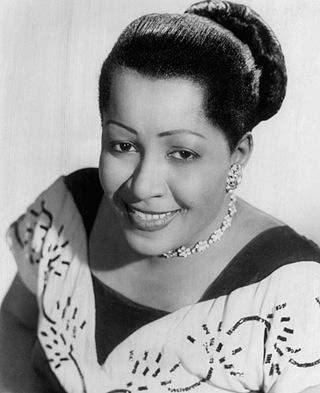
Nellie Rose Lutcher was an American R&B and jazz singer and pianist, who gained prominence in the late 1940s and early 1950s. Lutcher was most recognizable for her diction and exaggerated pronunciation and was credited as an influence by Nina Simone among others.
This is a list of notable events in country music that took place in 1948.
This is a list of notable events in country music that took place in 1947.

"Don't Worry 'Bout That Mule" is a song attributed to Charles Stewart, William Davis, Duke Groaner, and Fleecie Moore. It was performed by Louis Jordan and his Tympany Five, recorded in July 1945, and released on the Decca label.

"Texas and Pacific" is a song written by Jack Wolf Fine and Joseph E. Hirsch. It was performed by Louis Jordan and his Tympany Five, recorded in October 1946, and released on the Decca label. The song describes a rider's experience on the Texas & Pacific Railway. The "B" side of the record was "I Like 'Em Fat Like That".

"Jack, You're Dead" is a song written by Dick Miles and Walter Bishop. It was performed by Louis Jordan and his Tympany Five, recorded in October 1946, and released on the Decca label. The song describes a man's physical state if he fails to respond to romance.
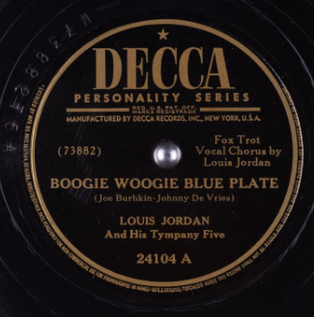
"Boogie Woogie Blue Plate" is a song written by Joe Burhkin and Johnny DeVries. It was performed by Louis Jordan and his Tympany Five and released on the Decca label.
Joseph Woodman Lutcher was an American R&B saxophonist and bandleader, the younger brother of singer Nellie Lutcher. He performed and recorded successfully in the 1940s, but later abandoned a commercial musical career and became an outspoken member of the Seventh-day Adventist Church.
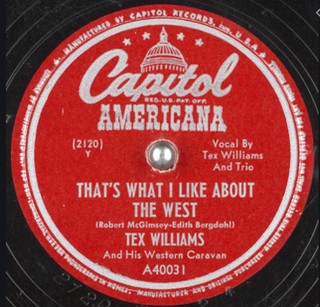
"That's What I Like About the West" is a song written by Edith Bergdahl and Robert McGimsey, performed by the Tex Williams, and released in 1947 on the Capitol Americana label. In October 1947, it peaked at No. 3 on the Billboard folk chart. It was also ranked as the No. 14 record on the Billboard 1947 year-end folk juke box chart.
The Billboard Most-Played Folk Records of 1947 is a year-end chart compiled Billboard magazine ranking the year's top folk records based on the number of times the record was played on the nation's juke boxes. In 1947, country music records were included on, and dominated, the Billboard folk records chart.
The Billboard Most-Played Folk Records of 1946 is a year-end chart compiled Billboard magazine ranking the year's top folk records based on the number of times the record was played on the nation's juke boxes. In 1946, country music records were included on, and dominated, the Billboard folk records chart.
Billboard Most-Played Race Records of 1947 is a year-end chart compiled by Billboard magazine ranking the year's top race records based on the number of times the record was played on the nation's juke boxes.Billboard assigned point totals to each record based on its juke box plays.
Billboard Most-Played Race Records of 1946 is a year-end chart compiled by Billboard magazine ranking the year's top race records based on the number of times the record was played on the nation's juke boxes.Billboard assigned point totals to each record based on its juke box plays.
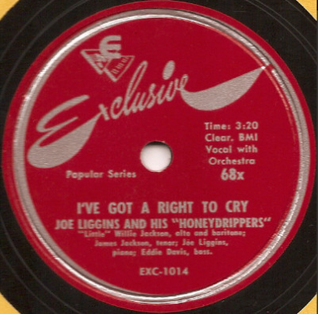
"I've Got a Right to Cry" is a song written by Joe Liggins.
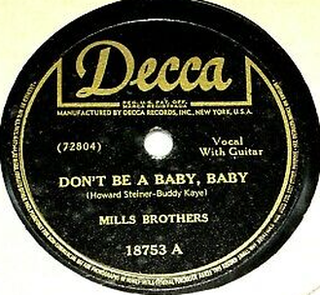
"Don't Be a Baby, Baby" is a song written by Howard Steiner and Buddy Kaye, performed by The Mills Brothers, and released on the Decca label. It peaked at No. 3 on Billboard magazine's race records chart and spent eight weeks on that chart. It also reached No. 12 on the pop chart. It was ranked No. 15 on the Billboard's year-end list of the most played race records of 1946.

"Beware" is a song attributed to Morry Lasco, Dick Adams, and Fleecie Moore. It was performed by Louis Jordan and his Tympany Five, recorded in January 1946, and released on the Decca label.

"That Chick's Too Young to Fry" is a song written by Tommy Edwards and Jimmy Hilliard. It was performed by Louis Jordan and his Tympany Five, recorded in January 1946, and released on the Decca label. The record's "B" side was "Choo Choo Ch'Boogie".
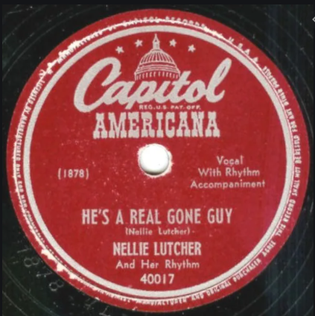
"He's a Real Gone Guy" is a song written and sung by Nellie Lutcher with backing on the record by a group called "Her Rhythm". Lutcher also played the piano on the record which was released in July 1947 on the Capitol Americana label. It debuted on the Billboard magazine's race records chart on September 27, 1947, peaked at No. 2, and remained on the chart for 23 weeks. It was ranked No. 9 on the magazine's year-end list of the most played race records of 1947.

"New Orleans Blues" is a song written by Leon René and performed by Johnny Moore's Three Blazers, consisting of Charles Brown on vocals and piano, Johnny Moore on guitar, and Eddie Williams on bass. The record which was released in 1947 on the Exclusive label. It debuted on Billboard magazine's race records chart on June 28, 1947, peaked at No. 2, and remained on the chart for 13 weeks. It was ranked No. 11 on the Billboard's year-end list of the most played race records of 1947.












